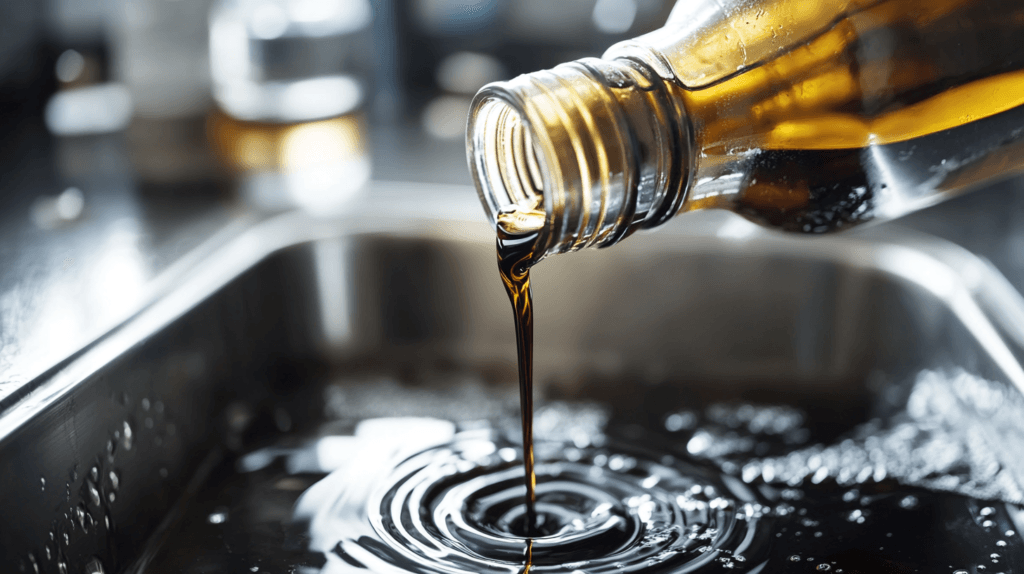Introduction
Balsamic vinegar is a pantry staple known for its rich flavor and versatility. Whether drizzled over salads, added to marinades, or used as a finishing touch to dishes, this vinegar elevates meals with its tangy sweetness. However, like all kitchen items, there comes a time when we need to dispose of it—perhaps it’s expired or leftover from a recipe. At this point, many people wonder, “Can you pour balsamic vinegar down the drain?” This article delves into the effects of disposing of balsamic vinegar this way, its impact on plumbing and the environment, and explores safer alternatives.
Understanding Why You Pour Balsamic Vinegar Down the Drain

What Is Balsamic Vinegar?
Balsamic vinegar originates from Italy and is made by fermenting grape must, which is freshly crushed grape juice. It is then aged in wooden barrels to develop its complex flavors. Authentic balsamic vinegar is thick, sweet, and tangy, while commercial varieties may include added sugars or thickeners.
Composition and Characteristics
The key ingredients in balsamic vinegar include:
- Acetic Acid: Gives it the tangy taste and antibacterial properties.
- Sugar: Adds a sweet balance to the acidity.
- Water: Helps dilute the strong flavor for culinary uses.
These components, particularly acetic acid, play a crucial role in determining how balsamic vinegar interacts with plumbing and the environment.
Why People Pour Balsamic Vinegar Down the Drain
Pouring liquids down the drain is a common household practice that stems from convenience and a lack of awareness about potential consequences. Let’s explore the reasons behind this behavior in greater detail:
1. Ease and Convenience
The sink is a natural destination for liquid waste because it’s quick and accessible. After cooking or cleaning, people often rinse food remnants and leftover liquids into the drain without giving it much thought. This habit saves time compared to other disposal methods, such as composting or storing waste for trash collection.
- Examples: Leftover soup, salad dressings, and beverage remnants like coffee or soda often end up in the sink because it’s faster than other options.
2. Belief That Liquids Are Harmless
Many people assume that liquids, including balsamic vinegar, won’t harm plumbing or the environment. This perception arises from the idea that liquids are water-soluble and easily diluted. However, not all liquids behave this way—especially those containing oils, sugars, or acids.
- Common Misconception: Sticky or acidic liquids like balsamic vinegar might seem harmless, but they can accumulate in pipes or alter the pH of wastewater systems.
3. Cleaning and Disposal Habits
Kitchen cleanup often involves rinsing off plates, pans, and containers. In doing so, leftover sauces, oils, and liquids naturally flow into the sink. For instance:
- Expired or Spoiled Items: People might pour out spoiled milk, juice, or vinegar directly into the drain without considering alternatives.
- Rinsing Containers: To prepare bottles or jars for recycling, many people rinse out contents like balsamic vinegar, sauces, or other liquid condiments, sending the residue down the drain.
4. Lack of Knowledge About Environmental Impact
Most households aren’t aware of the environmental effects of pouring liquids like balsamic vinegar down the drain. While a small amount may seem negligible, the cumulative effect of multiple households disposing of sticky or acidic liquids can strain wastewater treatment systems and impact ecosystems.
- Environmental Consequences: Acidity, sugar, or grease from liquid waste can disrupt wastewater processing and harm aquatic life if not properly treated.
5. Limited Awareness of Plumbing Risks
Plumbing is largely “out of sight, out of mind,” so people rarely consider the potential harm they might be causing to their pipes. Many homeowners don’t realize that sticky liquids like balsamic vinegar can:
- Adhere to the inner walls of pipes.
- Combine with grease and other particles to create clogs.
- Gradually erode older plumbing materials.
6. Cultural and Behavioral Factors
In many households, pouring liquids down the drain is a learned behavior passed down over generations. This habit can become so ingrained that people rarely question its appropriateness. Additionally, the assumption that municipal water systems can handle any waste adds to the prevalence of this practice.
7. Perceived Lack of Alternatives
Without easy access to composting or bio-waste disposal systems, people may feel they have no better option than pouring liquids into the sink. This is especially true in urban areas where composting programs are less common.
Effects of Pouring Balsamic Vinegar Down the Drain
Acidity and Pipes
Balsamic vinegar contains acetic acid, which can have varying effects on plumbing:
- Short-Term Impact: A small amount of diluted vinegar is unlikely to harm most pipes, especially modern systems made from PVC or stainless steel.
- Long-Term Concerns: Repeated exposure to acidic substances can erode older pipes, especially those made of metal like copper or galvanized steel.
Residue Build-Up
Balsamic vinegar is sticky due to its sugar content. When poured down the drain, it may not rinse away entirely, leaving a residue that can contribute to clogs over time, especially if combined with other food particles or grease.
Environmental Concerns About Pouring Balsamic Vinegar Down the Drain
Impact on Water Treatment Facilities
When vinegar enters the sewage system, its acidity can disrupt the pH balance of wastewater. While treatment plants are equipped to handle mild acidity, large quantities of balsamic vinegar or other acidic substances can create inefficiencies.
Effects on Aquatic Life
Acidity from improper disposal can affect water bodies and aquatic ecosystems if not treated properly. Even small disruptions in pH levels can harm fish and plants.
Can Balsamic Vinegar Be Harmful to Plumbing?
Reaction with Plumbing Materials
Most modern plumbing systems are built to withstand various household substances. However, balsamic vinegar’s acidity can pose challenges, especially for older pipes. Here’s what happens:
- Metal Pipes: Acids can corrode metal pipes, weakening their structure over time.
- PVC Pipes: Plastic pipes are more resistant to acidic liquids but may still develop residue buildup, which can trap other debris.
- Drain Seals and Joints: Acidic liquids may degrade seals, causing leaks in the long run.
Risk of Clogs
As balsamic vinegar flows down the drain, its sticky texture (due to high sugar content) can cling to pipes, particularly in cooler water where sugars crystallize more readily. Combined with grease or food particles, this can lead to clogs that are difficult to remove.
Alternative Uses for Leftover Balsamic Vinegar

If you’re hesitant to pour balsamic vinegar down the drain, consider repurposing it in these creative ways:
1. Culinary Uses
Even if it’s past its prime, balsamic vinegar can still enhance dishes:
- Use it in marinades for meats or vegetables.
- Mix it into salad dressings.
- Add a dash to sauces or glazes for extra depth.
2. Cleaning Agent
The acetic acid in balsamic vinegar can act as a natural cleaner. Although not as strong as white vinegar, it can be used for:
- Polishing brass or copper items.
- Cleaning glass or mirrors (when diluted).
- Removing minor stains on surfaces.
3. DIY Crafts and Repurposing
Get creative with leftover balsamic vinegar:
- Use it as a dye for paper or fabric for an antique effect.
- Create natural pest deterrents for garden plants when mixed with water.
How to Safely Pour Balsamic Vinegar Into the Drain
Dilution Method
If you must dispose of balsamic vinegar, dilute it heavily with water before pouring it down the drain. This reduces its acidity and prevents potential damage to pipes or the environment.
Composting
Balsamic vinegar can be added to compost in small quantities. The natural acids can aid in breaking down organic matter, provided they’re balanced with sufficient dry materials like leaves or cardboard.
Solid Waste Disposal
For significant amounts, soak the vinegar in absorbent materials like used paper towels or cat litter and dispose of it in the trash. This prevents the liquid from entering the sewage system.
Comparing Vinegar Types for Drain Disposal
Balsamic vs. White Vinegar
White vinegar is often used for cleaning and unclogging drains because of its high acidity and lack of sugar. Comparatively:
- White Vinegar: Safer for drains due to its simple composition.
- Balsamic Vinegar: Stickier and less effective as a cleaning agent, posing more risks to plumbing.
Apple Cider Vinegar
Apple cider vinegar shares similarities with balsamic vinegar in its sugar content, making it less ideal for disposal down the drain.
Tips to Prevent Issues When You Pour Balsamic Vinegar Down the Drain
Proper maintenance of your plumbing system can save you from costly repairs and ensure that your drains stay free of clogs and other damage. While occasional small amounts of liquid like balsamic vinegar may not seem harmful, repeated or improper disposal can lead to long-term issues. Here’s how to prevent these problems effectively:
1. Be Mindful of What Goes Down the Drain
- Avoid Pouring Harmful Substances: Refrain from pouring sticky, sugary, or greasy substances like balsamic vinegar, cooking oils, or leftover sauces down the drain.
- Separate Solids and Liquids: Use a strainer or mesh cover in your sink to catch food particles and prevent them from entering the drain.
- Dispose of Leftover Liquids Responsibly: Consider alternative disposal methods for liquids, such as composting or solidifying them before throwing them in the trash.
2. Regularly Clean Your Drains
Even with careful disposal habits, small amounts of residue can accumulate over time. Routine cleaning helps to clear out build-up and keep your pipes in good condition:
- Hot Water Flush: Once a week, run hot water down your drain to dissolve grease and prevent it from hardening.
- DIY Cleaning Mixture: Combine baking soda and white vinegar, pour it into the drain, and let it sit for 10-15 minutes before flushing with hot water. This natural method is safe and effective for clearing minor blockages.
3. Invest in Preventative Tools
- Sink Strainers: These inexpensive tools catch food debris and prevent clogs before they happen.
- Grease Traps: If you frequently cook with oils or fatty substances, consider installing a grease trap to collect and safely dispose of grease.
- Drain Covers: Use covers to prevent small objects or solid waste from entering the pipes.
4. Schedule Professional Maintenance
- Annual Inspections: Hire a professional plumber to inspect your pipes and address any potential problems before they escalate.
- Hydro-Jetting Services: For older or heavily used systems, consider hydro-jetting, which uses high-pressure water to thoroughly clean pipes.
5. Educate Your Household
Ensure everyone in your home understands proper disposal practices. Teach family members:
- What can and cannot be poured down the drain.
- The importance of rinsing pipes with water after using the sink.
- How to use strainers and dispose of food waste responsibly.
FAQs About Vinegar and Drains
1. Can Vinegar Dissolve Clogs?
White vinegar, when combined with baking soda, can help dissolve minor clogs. However, balsamic vinegar’s stickiness and sugar content make it less effective for this purpose. To understand more about balsamic vinegar’s properties and how it differs, refer to Does Balsamic Vinegar Have Alcohol?.
2. What Happens If Too Much Vinegar Is Poured?
Excess vinegar can temporarily alter the pH of your plumbing and water treatment systems. If this happens, flush the drain with plenty of water to minimize potential issues. For tips on storing balsamic vinegar safely to avoid waste, visit Should You Refrigerate Balsamic Vinegar?.
3. Are There Safer Alternatives to Vinegar for Cleaning Drains?
Yes, consider:
- Baking soda and hot water.
- Commercially available drain cleaners.
- Simple dish soap and hot water for grease removal.
Expert Opinions on Drain Safety
Insights from Plumbers
Plumbers generally advise caution when pouring any acidic substance down the drain, including balsamic vinegar. Their key recommendations include:
- Minimize Acidic Disposal: While occasional small amounts of vinegar are unlikely to cause immediate harm, consistent disposal of acidic liquids can corrode pipes over time.
- Flush with Water: Always follow acidic liquids with a generous flow of water to dilute their effects and reduce residue build-up.
- Use Proper Cleaning Solutions: Opt for drain-safe cleaning agents specifically designed to prevent clogs or damage.
Environmentalist Perspectives
From an environmental standpoint, vinegar—though biodegradable—can disrupt wastewater treatment processes if poured in significant quantities. Experts suggest responsible disposal methods, such as composting or repurposing, to reduce its environmental impact.
Tips for a Greener Kitchen Disposal
Being mindful of how you dispose of kitchen waste can benefit both your plumbing and the environment. Here are a few actionable tips:
- Compost Organic Waste: Use leftover balsamic vinegar and other organic materials to enrich your compost pile.
- Separate Liquids and Solids: Avoid flushing oily or sugary liquids down the drain; instead, dispose of them with solid waste when possible.
- Recycle Properly: Rinse out containers thoroughly to prepare them for recycling without pouring excess liquid into the drain.
- Educate Your Household: Share proper disposal practices with family members to ensure consistent and sustainable habits.
Case Studies or Common Mistakes
Real-Life Scenarios
- Clogging Issue: A homeowner habitually poured leftover salad dressing containing balsamic vinegar down the drain. Over time, the sticky residue combined with grease and caused a significant clog that required professional intervention.
- Pipe Corrosion: In another instance, an older plumbing system suffered from corrosion after repeated disposal of acidic substances, including vinegar. The cost of pipe replacement far exceeded the initial convenience.
Lessons Learned
- Small, infrequent amounts of balsamic vinegar might not cause noticeable issues, but regular disposal can lead to cumulative damage.
- Preventative measures like rinsing with water or opting for alternative disposal methods can save time and money.
Conclusion
So, can you pour balsamic vinegar down the drain? The answer depends on the quantity and frequency. While a small amount diluted with water is unlikely to harm modern plumbing, regular disposal of balsamic vinegar—or any acidic, sugary substance—can lead to clogs, pipe damage, and environmental concerns. If you’re unsure whether your balsamic vinegar is still usable, find out more in Does Balsamic Vinegar Go Bad?.
To ensure safe and sustainable disposal:
- Repurpose or reuse balsamic vinegar whenever possible.
- Compost small amounts for eco-friendly waste management.
- If pouring it down the drain, always dilute it with water and flush thoroughly.
Being mindful of how you manage kitchen waste not only protects your plumbing but also supports a healthier environment. For ideas on how to use balsamic vinegar in cooking instead of wasting it, try this Balsamic Chicken Recipe.

